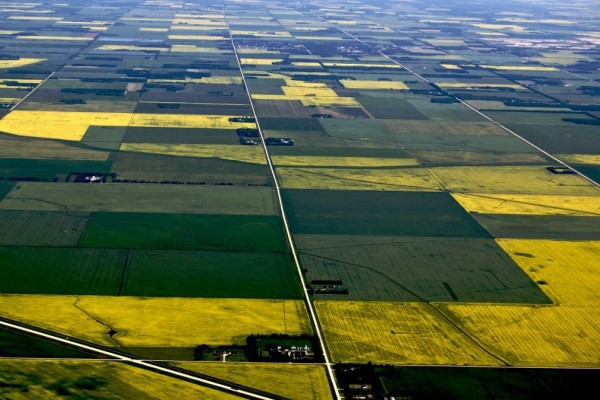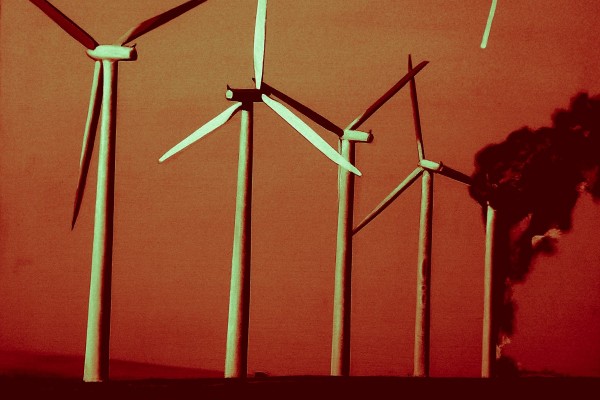How ‘Cannibal Capitalism’ is devouring the planet
Nancy Fraser’s latest book unravels the immense complexity of the system that is marching us toward the abyss

Smoke from wildfires in Canada engulfs New York City, June 2023. Photo by Anthony Quintano/Wikimedia Commons.
The world is a mess. In her latest book, Cannibal Capitalism, feminist philosopher and professor Nancy Fraser examines the multiple, complex sources of this mess.
Capitalism, we have long known, is a socioeconomic system rooted in exploitation and expropriation, whose main purpose is the production of commodities and the generation of surplus value. Fraser argues that these surpluses depend on cannibalizing humans and non-humans alike, causing immense harm to all forms of life in order to accumulate wealth, much of which is monopolized by a small group of (mostly) men. The disasters these men leave behind—what economists give the delightfully innocuous name “externalities”—are left to be cleaned up by devastated communities, shattered families, and cash-strapped governments. Even more alarming, the planet is now at a tipping point, transitioning from climate warming to climate boiling. Fraser refers to the calamities generated by this system as a “massive tangle of dysfunction and domination.”
The point of Cannibal Capitalism is to examine how this economic system rests on a thick foundation of non-commodification, on what she calls capitalism’s four “background conditions of possibility.”
These background conditions include racism and expropriation. She notes that capitalism has been rooted in white supremacy from the earliest days of European colonization, which initiated a worldwide theft of land and resources from Indigenous peoples and people of colour. Over time, this expropriation generated key social divisions. One of the most harmful of these divisions was that white workers in the wealthiest countries gained citizenship with its attendant rights, which enabled them to live in relative comfort. But that comfort was achieved partly by causing great suffering to others. To this day, many people in the majority world lead lives suffused with desperation. Even worse, in addition to facing expropriation, most of them are also subject to hyper-exploitation, earning pitiful wages and no benefits, while others subsist as sharecroppers or slum dwellers. And if these human beings should have the temerity to try to leave their desperation behind, to cross borders into the richer nations of the world, they are viewed by many citizens in these nations as alien invaders and are often treated as such.
This global insider/outsider division maps almost perfectly onto the divisions of race, of white versus every-other-colour. Even in the wealthiest parts of the world, within nation states, this division is replicated as well. For example, Black Americans have rights of citizenship, yet they are disproportionately subject to segregation, poverty, low wages, low social benefits, low life spans, incarceration, and disenfranchisement.
Fraser maintains that with the rise of finance capital in recent decades, this insider/outsider dynamic is changing. She says that we are witnessing the universalization of expropriation, as many of the formerly privileged workers in the richer nations have taken on more debt to cover the costs of housing, education, child care, and so forth, all in a context of declining trade unions and attacks on the welfare state. Today, almost everyone is exploited and expropriated in some manner, though racialized peoples still endure the worst effects of this system.
The second background condition of capitalism is personified by exhausted families. Capitalist societies have struggled for hundreds of years with the challenges posed by social reproduction. In the 19th century, the era of early industrial capitalism in the wealthy nations, the nuclear family was seen as the vehicle that could address these challenges. It did so mainly by keeping women at home, thus lowering their status and making them economically dependent on men. That setup never worked well even for most white families, never mind racialized ones where women had little choice but to work for wages alongside their household responsibilities. The 20th century welfare state was supposed to address some of these drawbacks, to help buttress the “family wage,” but its ability to provide substantial social supports came under stress when capitalism entered a long-term crisis, beginning in the mid-1970s.
One result of that crisis was that far more women, both single and married, began working for wages, not only because of a desire to be financially autonomous but also out of brute economic necessity. With these women under immense time pressure, social reproduction in the rich countries has become somewhat dependent on care workers imported from low-income nations, while the children of these poor female immigrants are cared for back home by even poorer women. Capitalism, it seems, has a limitless ability to metamorphosize, endlessly making and remaking chains of exploitation and expropriation.
The third background condition of capitalism is our physical environment, now in the process of collapsing. People are destroying nature, filling the earth, air, and oceans with toxins, which has produced an ever-quickening global warming that fuels fires, floods, hurricanes and other forms of pushback from the planet, which seems determined to send a message to all of us, one that dominates our daily news feeds, that it is tired of being our garbage dump.
Understanding this ecological crisis means we need to have a laser-like focus on capitalists as the problematic actors destroying our planet. These individuals have built-in incentives to steal as much as possible from nature and to continue extracting, including drilling for oil, even in the face of imminent environmental trauma. The negative outcomes of this trauma on human health, like everything else that is awful, are absorbed disproportionately throughout the world by racialized peoples in the forms of illnesses and early deaths.
The last of capitalism’s four background conditions is democracy—or the tepid version of the politics that pass for “democracy” in nations that worship “free markets.” Much of what is wrong with our politics, Fraser maintains, arises from much of what is wrong with capitalism.
Capital accumulation is enforced by states that preserve private property and the “right” to exploit and expropriate, crushing any resistance with police and military might if necessary. The state is not supposed to “intervene” in the economy and in many cases it doesn’t—there are hardly any controls on the movement of capital, no limits on how much property one can own, few maximums on price increases, no minimum tax payments (at least none with real bite), no annual dividends for the citizenry. When we collate all the policies that states choose not to implement, we clearly see whose side they are on. In the face of multiple social problems, states simply throw up their hands, hamstrung by their capitalist-imposed limitations, seemingly incapable of protecting their citizens, their communities, their economies. The results are societies where democracy is so limited—where it is excluded from so many critical aspects of socioeconomic life—that we might question whether any such democracy even exists.
In almost all societies, central banks and global financial institutions now have substantial (nondemocratic) rule-making abilities, which capitalist states have willingly subjected themselves to, in the interests of serving the rich. One result of this is that few people, even in the wealthy nations, can now say they feel safe and secure. The hard lesson for those of us who live in these nations is that our states have been “thrust into a position long familiar to those of the periphery: subjection to global economic forces they could not possibly hope to control.” In recent years, states have taken on huge debts, especially in the battle against the pandemic, and now have to pay rising interest rates on these debts, which pushes governments even further in the direction of austerity, enforced by rampant authoritarianism.
Fraser examines multiple socioeconomic divisions, especially divisions by class, race, gender, and nation (rich vs. poor). We could add to her list divisions by age (old vs. young), education (postsecondary credentials vs. a high school diploma or less), and location (urban vs. rural). This means that in any analysis of our current crisis and its effects on various groups, we must simultaneously juggle a lot of concepts in our heads. It is difficult to undertake this juggling, but it is important to do so if we are to come to terms with the length and breadth of the “entangled struggles” we face. Still, the complexity of it all can be overwhelming, not just intellectually or “in theory,” in trying to understand what is happening before our eyes, but also when it comes to figuring out how we can get to a place that isn’t mired in a series of rapid-fire disasters, a place where the cannibals themselves have been included on our ever-growing list of extinct mammals.
It is this challenge of “figuring out” that drives my only substantive quibble with Cannibal Capitalism. In the final chapter, which examines socialism, once we get past a rehash of the arguments on capitalism, we are left with just a sliver of ideas on how to move forward. As a result, the book—despite adopting the publishing industry’s most clichéd ending for subtitles—doesn’t tell us much about “what we can do about it.” The “three sets of brief reflections” Fraser offers, while “plainly partial and preliminary,” strike me as a bit thin on the ground. She suggests, first, that we must give thought to the boundaries between capitalism and its background conditions, by reimagining “the relations between production and reproduction, society and nature, the economic and the political.” Second, we have to place an emphasis on well-being, sustainable production, and a sustainable environment more so than promises of endless economic growth. Third, we need to democratize governing institutions to allow people to collectively deliberate and make decisions on issues that are critical to their lives.
Fraser provides hints here and there as to how the substance of these three reflections might be operationalized. It’s clear from reading Cannibal Capitalism that superseding this system will necessitate an unprecedented pushback from people in every corner of the globe. This is especially so when dealing with the ecological crisis, which requires creating “a broadly shared project of transformation.” When we look at our world, we can see a great deal of activism in defence of the environment: school strikes for the climate, Extinction Rebellion’s blocking of streets, calls for degrowth, and demands for a Green New Deal. But these efforts are not enough. Saving the planet and the creatures that inhabit it will require a “deep reordering of the economy/nature nexus, severely constraining, if not wholly abolishing, the prerogatives of capital.”
We have reached a point where many people accept that capitalism is in some ways broken or dysfunctional, if not in crisis, as a result of the climate emergency, the decline of democracy, the proliferation of racism, our rapidly declining birthrates (as babies become unaffordable luxuries), and our inability to prevent war crimes, even when they unfold before a worldwide audience in real time. In response, frustration with mainstream politics is growing everywhere. This leaves Fraser to ponder if we have we reached “a momentous historical crossroads,” one that will enable the emergence of a counterhegemonic project. And furthermore: “Who will succeed in constructing a viable counterhegemony, and on what basis?”
These questions, she acknowledges, are not easy to answer (and I certainly agree). This is especially so given that victims of exploitation and expropriation often display little solidarity with other such victims; oppressed humans unfortunately do “not see themselves as fellow travelers in the same (leaky, unseaworthy) boat.” There are some possibilities for cross-racial unity, for instance, but this has always been difficult and it is especially so in our age of “insecurity and paranoia,” as many white people flee into the arms of right-wing quasi-dictators.
Even the way we think produces obstacles to establishing solidarity. Fraser suggests that liberal and social democratic feminists, anti-racists, queers, and environmentalists are “entangled” in hegemonic perspectives. They do not see the necessity of directly challenging the power held by capitalists, and so their advocacy is “not yet integrated in a robust diagnosis of the structural-cum-historical roots of the present crisis.” These activists need to adopt more critical, anti-capitalist approaches, which would strengthen the counterhegemonic project.
Overall, few socialists will find much to object to in Cannibal Capitalism, and many will say they’ve been advocating for versions of the ideas put forth in this book for some time, including the notion that “what counts as an anti-capitalist struggle is… much broader than Marxists have traditionally supposed.” But Fraser, thankfully, is not just preaching to the converted. The book’s most valuable contribution (and a worthy one indeed) will be to poke and prod non-socialists who think we can have “free markets” as well as sustainable, democratic societies. Fraser makes it clear that we cannot.
This still leaves us, though, with little specific guidance on how to advance beyond cutthroat neoliberalism. Without that guidance, I don’t see how we can hope to establish anything resembling ecosocialism. In contrast, capitalism is likely to continue along its merry way, unfettered by its weak and inchoate opposition, in the direction of endless wars, socioeconomic immiseration for billions of people, and ecological collapse. Given the immense powers of capital, and the paralysis of most nation states in the face of these powers, we might even conclude that radical social changes are difficult to achieve, peacefully or violently. Perhaps that is why Cannibal Capitalism—and Fraser’s book is certainly not alone in this—provides a superb analysis of our quandary but not much practical advice on how to escape it.
Larry Patriquin is Professor of Social Welfare and Social Development at Nipissing University in North Bay, Ontario. He is the author of four books, including Permanent Citizens’ Assemblies: A New Model for Public Deliberation (Rowman and Littlefield International, 2020), which is available open-access. He tweets at @larryreadsbooks.










